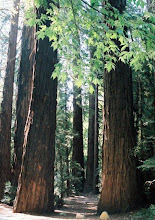Peace. It gets talked about a lot in faith circles. We pray for peace. We search for peace. Some people find peace in worship while others still haven't reconciled themselves to the fact that we are asked to exchange a sign of "the peace" of Christ with the people sitting around us, no less. Great people of faith seem to have a serene peace about them; it is one of the qualities that sets them apart from many of us. This peace seems to come from a deep faith or acceptance.
It's a quality a lot of people want as part of their spirituality. Some people search for inner peace through prayer, meditation, and other spiritual practices. Most of us have to work at it, but some people just "have it". Their faith just seems to give them a calm base; like weebles, they seem to be able to take the storms of life without falling down. Counselor-types call it having a "non-anxious presence".
I remember my maternal grandmother as having that kind of presence. Growing up, we spent summers with her. And in spite of all the kids and our mess and noise, she was always calm. There was only one time I remember her being upset.
My older sister had rescued a newborn kitten that was just a few days old. It's eyes weren't even opened when she brought it home. She fed it warmed formula from a doll's bottle and kept it warm. It was still so small when we came up, that it still needed care and attention.
A cousin had taken the kitten away and was being mean to it; and we went crying out to Grandma for help. I don't remember what she said or did, except that she flew out of the kitchen, apron flying and soon returned, having rescued the kitten from the cousin and the cow tank. She settled down with one of her good kitchen towels (the kind we would get in trouble for using to wipe our hands),gently wiping the kitten. She sat by the stove, holding the kitten up near her chin and softly singing Norwegian lullabies. Grandma was in her chair; the world was at peace.
But there are times in the gospels when Jesus is upset. Like my Grandmother, it is usually when he is looking out for the "little ones" and the "least of these"; the ones that need his help and protection. Our search for peace is never to come at the cost of the call to care for those in need.
Christ's peace comes from following his Way, which like the life he led, takes us out into the world to care for others.
Reading and studying the bible, daily prayer, yoga, meditation, deep breathing, all our spiritual practices will all fall short of peace unless we also reach out to others. God's peace is not self-contained; it is communal.
Living Christ's peace is something I know that I have to practice.
As a musician, the word practice has special meaning. Learning an instrument, getting a degree in music means hours of practice locking away in a small room working hard and also working hard in groups large and small until the notes on the page make the music contained in them.
Our spiritual practice takes the same dedication; time alone and time together in groups large and small. We come together to pray and praise, to give God what is due God, and in return, we are filled and strengthened to continue. Putting away our fears and anxiety doesn't mean running away from the world, but rather taking Christ with us into our everyday lives and giving him all the things we cannot control and do not know. Read Matthew 6:33-34



